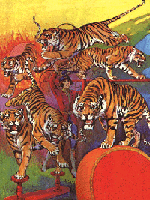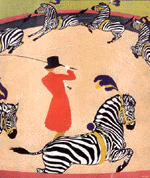|
Chapter 1. News I'll start the story one fall afternoon when I had been sent home from my friend Henry's house.
Henry stuck up for me: He said he'd wanted to see how much noise we could make, too, and so had everyone else. I'm glad he said that. His mother probably would have sent everyone home anyway, not just me, but it was still a good thing to say. The air was colder on the
way home, and the sky was orange at the edges and pale in the middle.
But there was still time to play outside before dinner, maybe enough
time for other people to come over. I ran the rest of the way.
But when I opened our door, my father was there, talking to my sister
Emmy. He looked excited. “I'm home early because
it's a special occasion,”he said, but he wouldn't say why, even
when Emmy asked in a cute way. “Daddy!”I said
(I never try to act cute). “You shouldn't have said anything if
you weren't going to tell us. It's not fair." But that just made
him laugh more. “At least give us a hint.” “It's something that
will be a big change for all of us - especially you two. No more questions:
we're eating soon and I'll tell you at the table.” When dinner was ready,
Emmy turned out the lights and I lit the candles (Emmy and I take turns
doing that) while our little brother and sister got in their places.
It WAS a special dinner: lasagna! We ate while our parents talked: we're not allowed to unless one of them asks us a question. This is a rule most families don't have, I know. We have it because my father says “adult conversation is very important.”He says most people stop talking to each other when they're married and he doesn't want that to happen to him and my mother. So they, mostly my father,
talked, and sometimes I listened and sometimes I didn't; that night,
I listened even to some of the really boring things, but I still didn't
find out what the news was. |
Click
to see |
|
Emmy
and Willy, who sit next to each other, were doing something on their
laps - passing something back and forth, I think: I couldn't see what.
Willy was giggling, though. Bubby played with her food. I wrote on the
table. This is kind of a strange habit, I guess, but I like to do it.
I hold my pointer figure between my thumb and my middle finger, as though
my finger is a pencil, and then I write with it. “It's too bad no one
will ever read all the great novels Libby's written on the dining-room
table,” he said (he knows I want to be a writer when I grow up
- everyone who knows me knows that!). Then he and my mother laughed. I didn't. Emmy didn't laugh, either. We didn't make a face at each other - those kinds of faces count as talking - but we both hate it when he's sarcastic. Grown-ups are never funny when they say sarcastic things and I wish they wouldn't do it, especially to children. Of course, I didn't say that. I wrote it on the table, though. Finally, he said he would tell us the news. “We're moving to England
for six months. I've been transferred to the London office of J. Walter
Thompson. They wanted me to go alone, and come back for a visit after
three months, but I said 'No, I want to bring my family with me.' So
we're all going.” I was still trying to imagine an ocean liner. “Will we be on the ship for a long time? Will it have a gangplank and portholes?”I said.
"Like Libby!”I said.
|
The France leaving New York Harbor.
The Liberté sailing into New York Harbor on her maiden voyage. |
|
Go back to the list of chapters and stories
Blow Out the Moon (former title There and Back Again) copyright © 1999, 2000 Libby Koponen. All rights reserved. The pictures of ocean li ners are from the collection of Kevin R. Tam. Used with permission.
|
|






